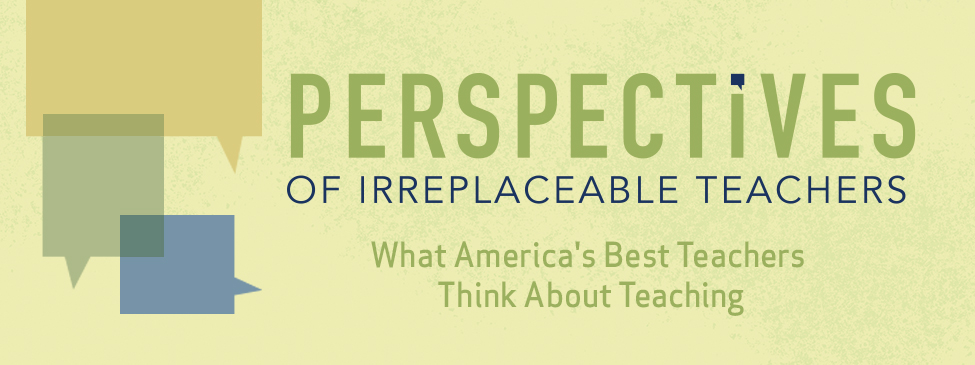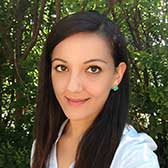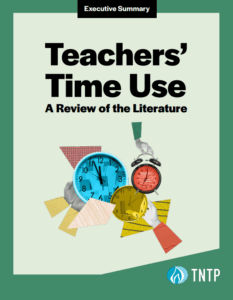At TNTP, we believe that a worthy teaching profession should be built around its most outstanding members. For our new report, Perspectives of Irreplaceable Teachers, we surveyed 117 of the nation’s best teachers, to hear their views on education policy and the teaching profession.
Today, we continue those efforts by turning this space over to a former TNTP Teaching Fellow and current DC Policy Fellow with Teach Plus, Wagma Mommandi. Like most of the teachers we surveyed, Wagma found she was unprepared for the classroom after completing her training program five years ago—training that was provided by us. We have since transformed our training to focus on hands-on practice and intensive coaching.
Her critique is important, and it’s something that all teacher-prep organizations need to hear more of. It also points up recent findings by NCTQ and our report Leap Year, which described how we overhauled our preparation programs to base certification on teachers’ demonstrated performance in the classroom, and their ability to grow over time.
TNTP’s new report Perspectives of Irreplaceable Teachers highlights what top teachers think about their profession—and the findings are important, because the opinions of top-performing teachers should be readily available (and put to good use) on topics that have clear policy ramifications.
Among the report’s findings: the best teachers generally do not attribute their success in the classroom to their formal preparation programs or the professional development they received once they began teaching.
This resonates with me. I came to teaching through DC Teaching Fellows, a partnership between DC Public Schools and TNTP. Now, as I enter my fifth year in the classroom, teaching high school biology in DC Public Schools, I only know a handful of teachers from my program who remain.
During our training, we were told that good teachers work tirelessly to close the achievement gap. We learned good teachers believe all students are capable of learning. But many of us were unsuccessful at first because we didn’t learn what effective teaching actually was. We did not know what good teaching looked like in a high-need classroom, and we certainly did not practice it in settings that would resemble what we were to face in the Fall. I now see my preparation program as my ticket into the classroom—not the element that allowed me to succeed.
Five years later, I am an effective teacher because I saw what effective teachers were doing in my school, after my training was complete, and I realized that I needed to learn from them in order to survive. I have spent years adjusting and tailoring these teachers’ strategies to my strengths and weaknesses through trial and error in my classroom.
These opportunities were hard-won. As a new teacher, the only opportunity I had to observe effective veteran teachers was during my own planning period; as a result, the first time I walked into a classroom to watch a veteran teacher was in the spring of my first year of teaching. It would be tremendously beneficial to pre-service, new and struggling teachers if more efficient structures were in place that allowed them to observe and collaborate with those who are successful in their buildings. Current structures do exist in DCPS for teachers to find other teachers to observe; however, these opportunities are not well advertised—I did not know they existed—nor are they set up in a way to encourage participation.
It would be helpful—not only in my district, but everywhere—if new or struggling teachers were automatically allotted a certain number of days per year to observe other teachers. If it didn’t make fiscal sense to do this, then professional development days could be staggered among schools so they do not fall on the same day, allowing teachers to use part of their professional development time to observe others at different sites. Additionally, highly effective teachers should be allotted time and compensated to observe and offer feedback to newer teachers, setting the stage for meaningful mentorship. Furthermore, districts could publish lists of top-performing teachers who are willing to be observed, identified by subject and skill (a very easy task in DCPS, since we are evaluated formally and that data is readily available), so teachers can go beyond their own schools for new ideas.
TNTP recommends that teacher training and development focus on real world practice and feedback. I couldn’t agree more with this common sense solution. In fact, since my summer of training, TNTP has radically changed its own model for pre-service training (disclosure: I worked as a TNTP new teacher development coach last summer), having realized that the needs of teachers in high-need urban classrooms are unique. Now the program focuses almost exclusively on directly coaching new teachers and having them practice techniques.
As I reflect back on what makes me a good teacher now, I can’t help but think that I would have been highly effective—or certainly more so—from the beginning if my training and development had centered on observing effective teachers, implementing their techniques and receiving consistent feedback on my own teaching. Clearly, as Perspectives of Irreplaceable Teachers reveals, many other high-performing teachers feel the same. If we can start preparing new teachers that way and continuously supporting them during their first years, we’ll have more effective teachers entering and staying in the classroom.








